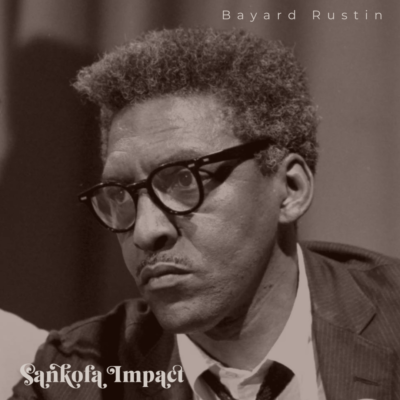“Let us be enraged about injustice, but let us not be destroyed by it.”
—Bayard Rustin
Born in 1912 and raised by his grandparents, Julia and Janifer Rustin, young Bayard Rustin was raised in the Quaker tradition. He attended two HBCUs, Wilberforce University and Cheyney State Teachers College. Rustin was a pacifist, following the nonviolent teachings of Mahatma Gandhi and applying them to his own work in the struggle for civil rights.
Rustin was an expert organizer and strategist. He collaborated with leaders like A. Philip Randolph to organize various marches and protests. He worked with George Houser of CORE to organize Freedom Rides. Rustin was also an influential adviser to Dr. Martin Luther King Jr. on the practice of nonviolence and civil disobedience. He helped form the Southern Christian Leadership Conference (SCLC), and helped to organize the Montgomery Bus Boycott.
Rustin was an openly gay man. His intersectional identity of being both Black and gay, would prove very challenging. Dr. King would be advised to distance himself from Rustin due to Rustin’s sexuality. However, while not working together in an official capacity, Rustin continued to advise Dr. King.
One of Bayard Rustin’s most notable achievements was his work as Deputy Director for the 1963 March on Washington. While forced to take a less public role in the march due to his sexuality, his expert skills in organizing heavily influenced the successful outcome of the march.
Later in his life he would continue his work in activism by focusing on advancing LGBTQIA+ rights before his death in 1987 at the age of 75. In 2013, President Obama posthumously awarded Bayard Rustin the Presidential Medal of Freedom, affirming his work and legacy as one of the most effective organizers and activists of the civil rights movement.

